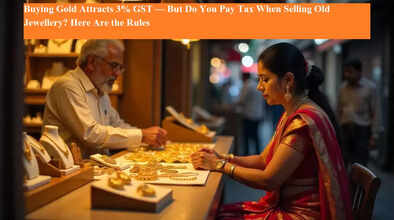Buying Gold Attracts 3% GST — But Do You Pay Tax When Selling Old Jewellery? Here Are the Rules

With gold prices touching record highs, many people in India are considering selling their old jewellery to cash in on the surge. But one common question arises: Do you need to pay GST when you sell your old gold ornaments? The answer depends on who is selling the jewellery and under what circumstances. The government has already laid down clear rules, and every customer should understand them before making a transaction.
GST on Buying Gold
When you purchase new gold jewellery, whether it is 22-carat or 24-carat, a 3% Goods and Services Tax (GST) is levied on the value. This tax is uniformly applied across all types of gold jewellery. For example, if you buy new ornaments, you will pay the price of gold plus an additional 3% GST.
What Happens When You Sell Old Jewellery?
Here’s where the rules change slightly. The GST impact is not the same for every seller.
-
If an individual sells old jewellery to a jeweller: No GST is applied. A regular person who simply wants to sell personal jewellery to get cash does not fall under the category of “supply” under GST law.
-
If a registered dealer sells old jewellery: GST will be applicable.
-
If an unregistered gold trader sells old jewellery to a jeweller: GST applies here as well, but through a mechanism known as Reverse Charge Mechanism (RCM).
In short, if you are just a customer selling your old bangles, necklaces, or bracelets, you don’t need to worry about GST. But if the seller is engaged in the gold trade, the rules become stricter.
Reverse Charge Mechanism Explained
When GST was first introduced, the government clarified how transactions involving unregistered gold traders would be taxed. If an unregistered supplier sells gold to a registered jeweller, the jeweller must pay GST on that transaction under the Reverse Charge Mechanism (RCM).
This means the responsibility of paying GST does not fall on the small, unregistered seller but on the jeweller purchasing the gold.
GST on Resale by Jewellers
Once the jeweller acquires old jewellery and resells it, the usual 3% GST again comes into play. For example, if a jeweller melts old gold and makes new ornaments or resells the gold in another form, buyers will have to pay 3% GST on that purchase.
What It Means for Ordinary Customers
If you are a normal customer who wants to sell old jewellery for cash, there is no GST burden on you. You simply receive the value of your gold from the jeweller.
However, if you are in the business of buying and selling gold, then GST provisions will apply based on whether you are registered or unregistered.
Key Takeaways for Gold Sellers
-
Buying new jewellery? Always pay 3% GST.
-
Selling old jewellery as an individual? No GST applies.
-
Selling old jewellery as a registered or unregistered trader? GST applies, with RCM applicable in the case of unregistered sellers.
-
When jewellers resell old gold jewellery? Buyers must again pay 3% GST.
Final Word
For everyday customers, the good news is simple — selling your old jewellery does not attract GST. But for traders and jewellers, GST rules remain in force to ensure transparency and proper tax compliance.
So, before you head to the market to sell your gold, make sure you know whether you are doing it as a consumer or as part of the trade. Understanding this distinction will save you confusion and help you get the best value without worrying about additional taxes.

